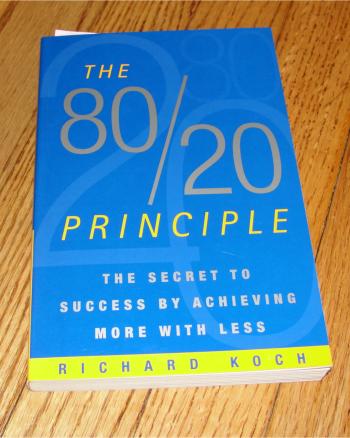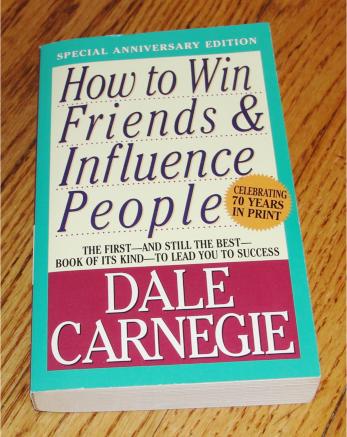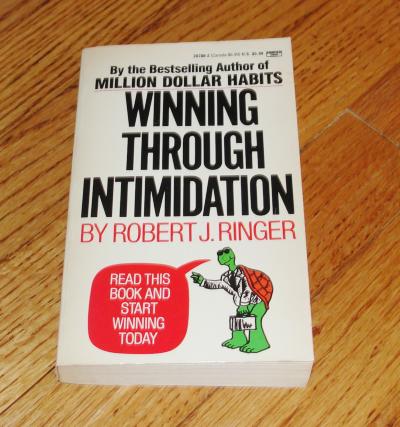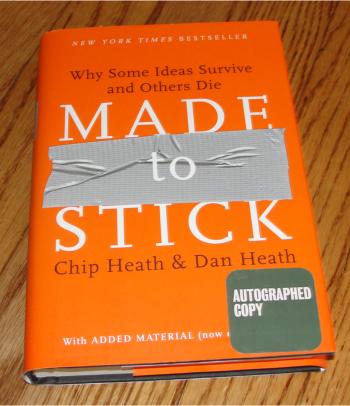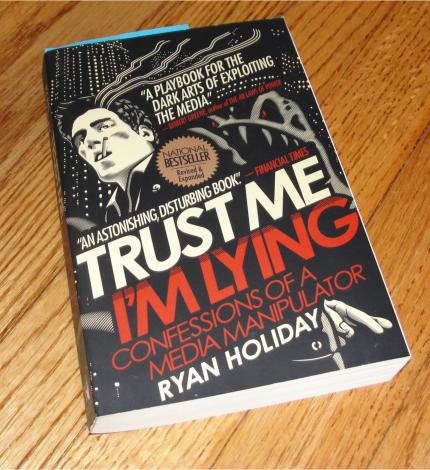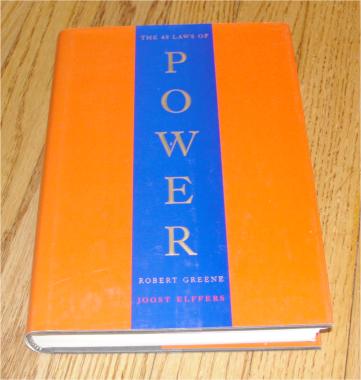Politics, Persuasion, and Mass Domination
So, do you really want to start a new political party? Do you actually want your ideas to spread? Do you want to change minds and/or win elections? If so, I have a useful reading list for you. But first some warnings:
- Some of these books contain dangerous knowledge! They teach you how to bypass the rational parts of the human brain, how to change beliefs all too easily.
- Many of these books teach skills. If you simply read them without doing some exercises, they will have very little impact. (And no, I have not achieved mastery. I’ll let others do that.)
- Some of these books are amoral, or outright evil. It is useful to know the tools of the enemy, but to use them can lead one down the path of Saruman. Beware!
As always, inclusion of a book does not necessarily imply agreement with the author. Some of the books I recommend more than others. Read the blurbs to know which.
Basic Political Organizing
Before writing science fiction, Robert Heinlein was a ground-level political activist, and a lefty one at that. He wrote a rather handy manual based on his experiences – that wasn’t published until the Perot days. Many of the ideas are dated in this age of super PACs and paid political consultants, but they are probably still relevant for minor parties.
Actually his strategy worked surprisingly well for the Ron Paul campaign. He suggested that the easiest way to beat The Machine is to take over whichever major party is weak in your area. It’s surprisingly easy. Even the major parties have difficulty filling all their officer positions. I’ve witnessed hippie/peacenik/environmentalists win local officer roles and delegate slots within the Republican Party.
An upstart political party needs hardcore activists, people willing to put in hundreds of hours and dollars for the cause long before victory is within sight. The Communists mastered the art of activist development, using techniques straight out of the New Testament(!) Douglass Hyde, a former longtime Communist turned Roman Catholic, reveals these techniques to a Catholic audience in Dedication and Leadership. This is powerful stuff! I have given out many copies of this book over the years.
Strategy
A new political movement will have limited resources. It is thus wise to master the Theory of Constraints. The Goal introduces the Theory in the form of a business novel, one that is surprisingly compelling. The bottleneck diagrams found within my new party manual were inspired by this work.
You cannot do everything. Focus on the important. This is the lesson of the 80/20 Principle. Apply the Principle to both tactics and platform. (Too many planks scare off voters.)
And now for The Biggie: The Tipping Point by Malcolm Gladwell. Buy it. Read it. Lend it to all your party officers and activists. The book describes how ideas, fads, and fashion are spread by three different types of people: Connectors, Mavens, and Salespeople. A movement that relies too much on salespeople requires mass quantities of money and mastery of Jedi techniques described in some of the books below. Appeal to Connectors and Mavens, and your ideas can spread more “naturally.” (Hint: the appeals to selfishness common among Libertarians are off-putting to Connectors. Errors in platform and philosophy are dug up by Mavens; do not rely on magical soundbites.)
Persuasion Fundamentals
If you are a crusty nerd, prone to criticism and correction of lesser minds, you absolutely, positively, need to read How to Win Friends and Influence People by Dale Carnegie. Come to think of it, I need to reread this one on a regular basis myself…
Winning Through Intimidation isn’t nearly as evil as the title suggests. Robert Ringer tells a humorous set of anecdotes of a salesperson struggling to keep customers from screwing him out of his finder’s fees. The underlying lesson has great relevance to any upstart political movement. Indeed, Donald Trump used the principle to great effect in his successful takeover of the Republican Party.
And now for the first lessons in potentially evil Jedi mind tricks: Influence by Robert B. Cialdini catalogs the many techniques used by fundraisers to get you to part with your money. Much human hard-wiring is revealed. If you want to raise money, you need this book. If you stick to Reason while your opponents go straight to the human operating system, you lose. But please use some restraint. These ideas can be abused. (Disclosure, I am still reading this one. It’s a moderately dense read, and I do not relish the thought of using these techniques myself.)
Rhetoric; i.e., Written Persuasion
Do you suffer from Bureaucratic Prose? Does your writing sound read like a sociology journal or a requirements specification for a military contract? If so, you absolutely need to read Style, Ten Lessons in Clarity and Grace, by Joseph M. Williams. And you need to do the exercises therein – and then craft some exercises of your own. (I should reread and do more exercises myself…) This book takes a no-fluff engineering approach to crafting a better sentence. An engineer can apply the lessons.
This book won’t make you the next Malcolm Gladwell or P.J. O’Rourke. But it will make your prose less-bad enough that people can read it.
Did you go to a high school where the English teachers were too overworked or lazy to assign and grade long form content? Did your teachers fail to teach the basics of writing a standard dissertation [often called essays, incorrectly]? If so, The Lively Art of Writing will teach you the basics.
Persuasion gurus are not a new phenomenon. The sophists taught the art in ancient Greece before Socrates coined the term Philosophy. Aristotle cataloged the techniques, just as he cataloged everything else known at the time. His book on Rhetoric remains in print to this day. I have not read it yet, but it’s on my todo list…
Memecraft and Media Manipulation
Why do some ideas go viral? Why do some public service campaigns work and others don’t? The Heath brothers address these issues in Made to Stick and Switch. Disclosure: I have only made it 2/3 of the way through the first book before running out of steam. The examples given are mostly authoritarian, so I found it a hard read. And frankly, I’d rather focus on coming up with good policies and let someone else do the memecraft…
On the other hand Ryan Holiday describes the art of media manipulation through vivid – and disturbing – tales in Trust Me, I’m Lying. You can use the arts for evil, or less bad. Your choice. After you read this book, your trust in what’s left of the news media will reach a new low.
Neuro Linguistic Programming
Become a Jedi you want? Manipulate weak minds you wish? Learn NLP then you must!
The creators of Neuro Linguistic Programming make incredible promises, promises that make me suspect exaggeration in the New Age range. But the field is interesting, and I have seen some of the tricks used to impressive effect. Scott Adams noticed Donald Trump using some of these mind tricks in the early stages of the Republican primaries, and predicted a Trump victory while most pundits didn’t even think Trump was serious. Prescient he was...
Some caveats:
- The techniques require practice and probably in-person training to master. Reading about NLP is rather like reading about a martial art.
- If the techniques are anywhere close to as powerful as advertised, they are dangerous. Use caution. Belief systems should be hard to change!
That said, moderate use of these techniques is often necessary to get people to honestly think about new ideas long enough to rationally evaluate them.
Frogs into Princes is one of the earliest books on the subject. The text is transcripts from live training, so you need to use your imagination to fill in some blanks. But the basic ideas get across. The fundamental idea behind NLP is that our brains do not readily think in pure abstractions. We use sensory representations and metaphors internally. Listen closely enough to a person’s word choices and you have a window into how that person is representing an idea internally. NLP also views the mind as a multitude of parts/programs with different agendas, and suggests techniques to communicate with the relevant part of the mind. Interesting stuff.
Trance Formations is an introduction to Ericksonian hypnosis – once again in the form of transcripts from live training sessions. This is a very different approach to hypnosis than what you see in old movies or Doctor Who episodes. No swinging watches or spinning spirals here. The techniques bear a strong resemblance to Obi Wan Kenobi’s mind games in the original Star Wars.
Given the fuzzy definitions of hypnosis herein, I suspect New Age exaggeration. But I would note that Donald Trump used some of these techniques in his rallies, and he is now on the way to becoming President…
For a much more academic approach to Ericsonian hypnosis, try Patterns of the Hypnotic Techniques of Milton H. Erickson, M.D.
Raw Power
If you are evil, or want to play Saruman and use evil techniques for a good cause, I have a few more reads for you.
If you follow the authors’ advice in The 48 Laws of Power you will become a worse person, guaranteed. Between their amoral editorializing and lessons from the days of powerful monarchs and fawning courtiers, you too can become a slimy backstabbing metrosexual. Or you can read these historical vignettes and compare with today to appreciate the relative benevolence of markets vs. power games.
For more modern examples of power games, see Michael Korda’s Power: How to Get It, How to Use It. I am uncertain as to whether this book is satire or serious advice. Either way, it is a window to the bygone era of steeply progressive tax rates and Organization Men – a time when power and perks were the prime currency for many. Those who would go back to those days would do well to remember the downsides. Money is not the only currency. There are other forms of inequality.
Finally, for those frustrated by democracy, there is Coup d’Etat, a Practical Guide. This is a political science dissertation written as a how-to guide for dramatic effect. It wasn’t actually meant to be used as a manual.
Or was it?





